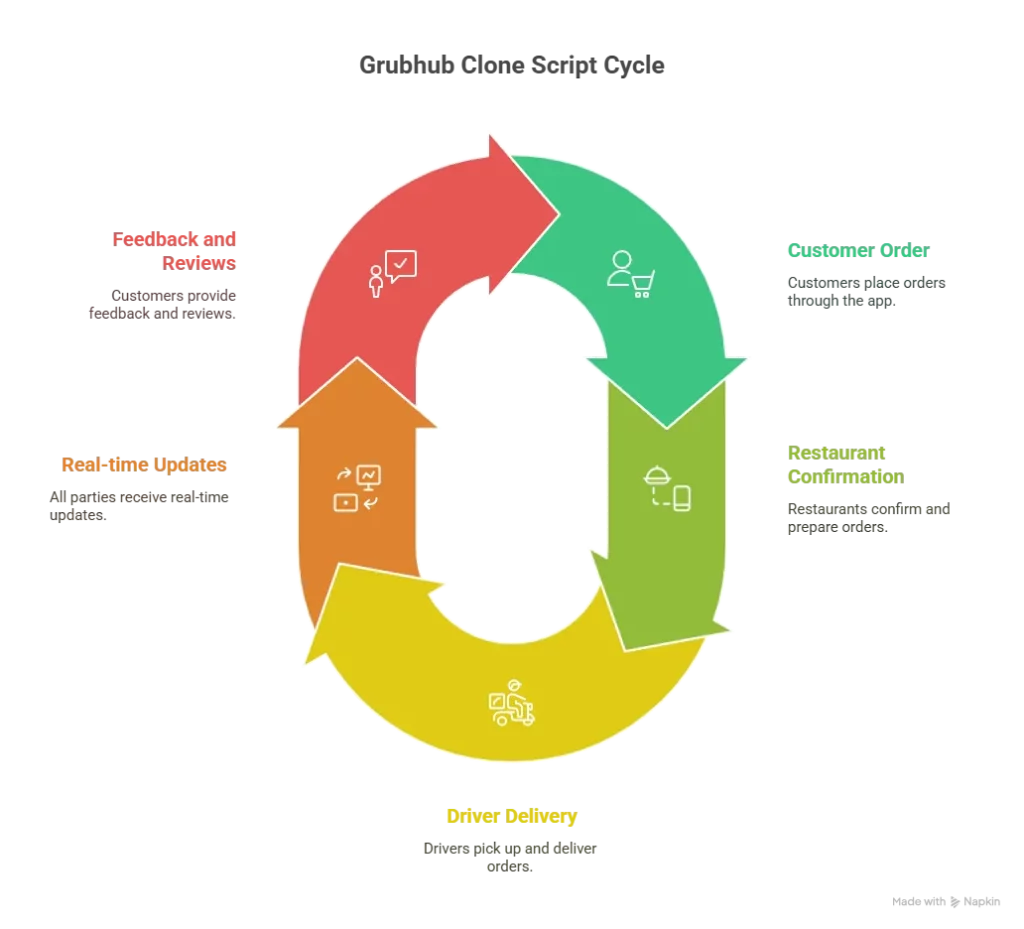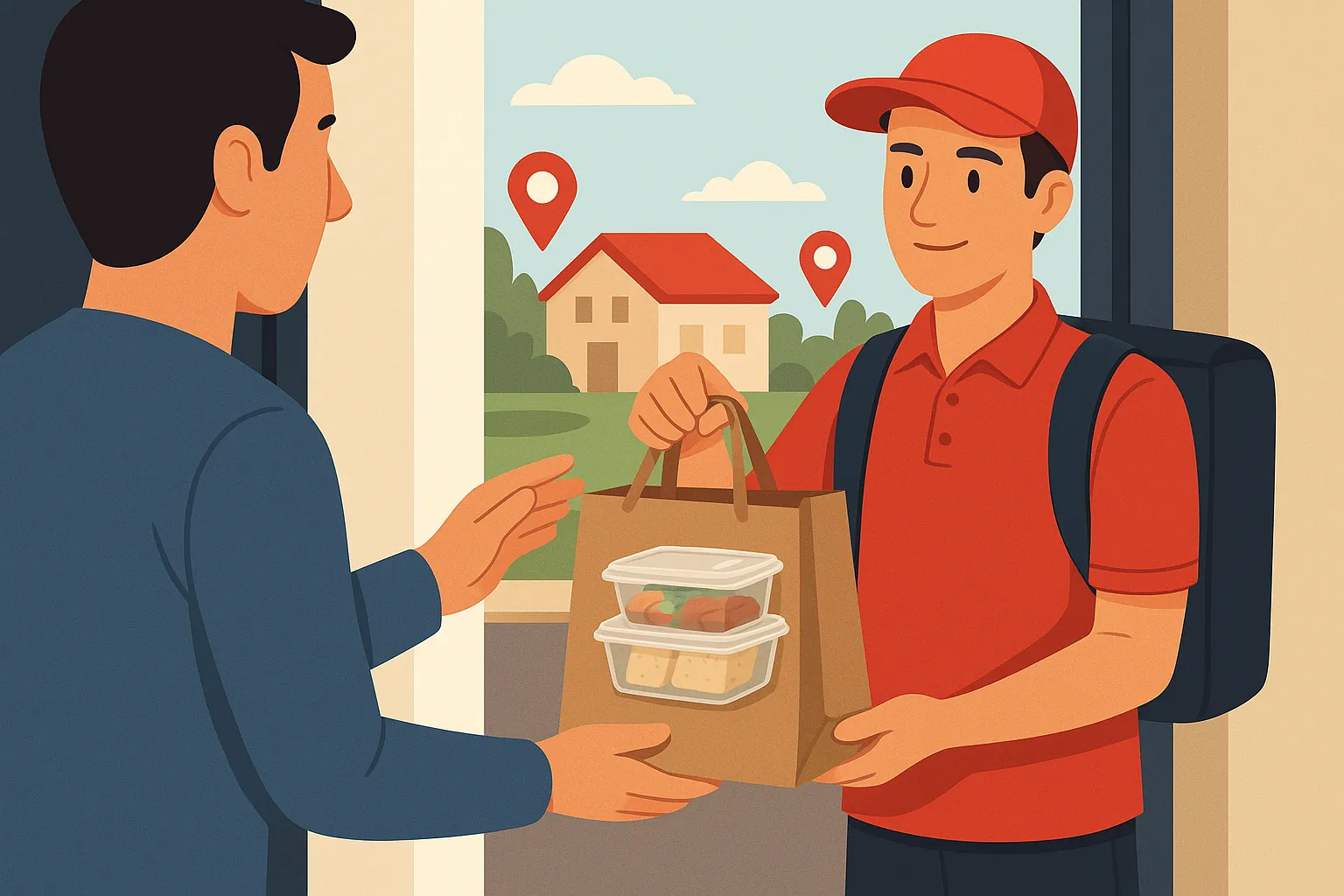Once considered a convenience, on-demand food delivery has become a part of daily life for millions. People are no longer just ordering food on weekends or during rainy days. From breakfast to late-night snacks, consumers now expect their favorite dishes at their doorsteps with just a few taps.
In the U.S. and other major markets, Grubhub helped shape this behavior. But as the food delivery space continues to expand, there’s a growing demand for regional platforms that cater to local preferences, restaurant partnerships, and pricing dynamics. Entrepreneurs are now exploring how to build their own Grubhub-style platforms that reflect their city’s unique culinary culture.
Enter Grubhub clone scripts—ready-to-launch software solutions that enable founders to replicate the operational logic of top food delivery platforms without starting from scratch. In 2026, these clones are more sophisticated, more customizable, and more scalable than ever.
Why Grubhub’s Model Still Holds Strong in 2026
Grubhub has always prioritized restaurant aggregation, fast logistics, and customer convenience. But it’s not the only one anymore. Local and niche platforms are emerging to serve specific geographies or food types. There’s a clear opportunity to replicate the Grubhub experience while adding your own twist—whether that means better delivery economics, curated vendor lists, or direct-to-customer branding.
In fact, more restaurants are open to joining platforms that offer favorable commission structures, faster payouts, and local marketing support. A Grubhub-style clone, when done right, provides a backbone for such partnerships
Read More : What is Grubhub App and How Does It Work?
Core Features to Expect in a Grubhub Clone Script

Grubhub clone scripts must support a three-sided platform: customers, restaurants, and delivery drivers. Here’s what a fully functional version includes:
Customer-Facing Features
- Restaurant discovery based on cuisine, rating, and distance
- Real-time order tracking with live updates
- Scheduled and ASAP ordering options
- Cart customization with item instructions
- Coupon engine, wallet, and loyalty programs
- Reviews and star rating system
Restaurant Vendor Panel
- Menu and inventory control
- Order notification and preparation timer
- Payout reports and commission visibility
- Profile and hours of operation settings
- Accept/reject orders based on availability
- Promotions, banners, and sponsored listings
Delivery Driver Module
- Job acceptance and route mapping
- GPS tracking and order updates
- Earnings calculator and tipping system
- Proof of delivery (signature, image, OTP)
- Offline/online status toggling
- Delivery performance dashboard
All modules must sync in real-time to ensure a seamless customer experience and operational transparency.
Read More : Creating Your Own Grubhub Clone: Key Features and Development Steps
Advanced Features for 2026 Platforms
To stay competitive in the modern food delivery market, clone scripts in 2026 are offering advanced capabilities:
- AI-based dish recommendations
- Smart delivery dispatching using heatmaps
- Dynamic delivery fees based on time, weather, or demand
- In-app chat support with automated replies
- Multiple payment integrations including BNPL (Buy Now, Pay Later)
- White-labeled restaurant apps within the main platform
These advanced features help you stand out in a crowded market and provide deeper engagement for both customers and vendors.
Cost Factors & Pricing Breakdown
Grubhub-Like Food Delivery Development — Market Price
| Development Level | Inclusions | Estimated Market Price (USD) |
|---|---|---|
| 1. Basic Food Delivery MVP | Restaurant listings, menu pages, cart & checkout, delivery/pickup selection, basic order tracking, simple admin for restaurants, orders & users. | $50,000 |
| 2. Mid-Level Multi-Restaurant Delivery Platform | Web + mobile UI/UX, multi-restaurant ordering, real-time order status, coupons, ratings, vendor dashboards, notifications (SMS/email/push), multiple payment gateways, analytics. | $120,000 |
| 3. Advanced Grubhub-Level Platform | Delivery partner system, automated order assignment, route optimization, zone-based fees, loyalty & rewards, subscription models, surge pricing, enterprise-grade scalability. | $240,000+ |
These values highlight the global market cost for building a Grubhub-style platform from scratch — depending on delivery orchestration, vendor scaling, mapping features, and real-time logistics.
Miracuves Pricing for a Grubhub-Like Platform
Miracuves Price: $2,899
This includes a complete multi-restaurant ordering and delivery system with customer app, vendor panel, delivery configuration, promo engine, real-time order updates, and a powerful admin backend — ready for branding and launch.
Note:
Comes with full non-encrypted source code, deployment support, backend setup, API integrations, admin configuration, and publishing support — enabling you to go live quickly with a stable, fully functional food delivery platform.
Get Your Grubhub-Style Delivery Platform — Contact Us Today
Delivery Timeline for a Grubhub-Like Platform with Miracuves
A typical delivery timeline is 3–9 days, depending on:
- Number of restaurants and service areas
- Delivery model (own fleet, third-party, or hybrid)
- Required monetization options (commission, delivery fees, promos)
- UI/UX customization and branding
- Localization (languages, currencies, tax rules)
- Payment gateway & notification integrations
Tech Stack
The platform is built using PHP, providing reliable performance, modular scalability, secure API handling, and flexibility to support multi-restaurant operations, delivery management, and high-volume transactions across regions.
Who Can Benefit from a Grubhub Clone?
This model is highly versatile and suits a variety of business strategies:
- Local entrepreneurs wanting to launch a food delivery service in underserved cities
- Restaurant chains looking to bypass expensive aggregators
- Franchise networks building their own closed-loop ecosystem
- Event-based catering services offering scheduled group orders
- Campus food delivery startups for universities or co-living spaces
Each use case can leverage the Grubhub-style model with minor modifications to fit the local context.
Read More : Reasons startup choose our Grubhub clone over custom development
Revenue Models for Grubhub Clone Platforms
You don’t need to rely solely on delivery fees. Here are multiple monetization streams used by successful food delivery apps:
- Restaurant commissions on each order
- Customer delivery charges based on distance or time
- Surge pricing during peak hours
- Subscription models for free delivery (e.g., monthly plans)
- Ad placements within the app (top listings, banner slots)
- Tipping and premium delivery options
- POS or loyalty integrations as paid services for restaurants
With the right monetization strategy, even platforms operating in smaller markets can become highly profitable.
Read More :Grubhub Marketing Secrets for Startups
Conclusion
Grubhub set the foundation for modern food delivery. But in 2026, the opportunity lies in creating localized, scalable, and efficient food delivery platforms that reflect the unique needs of your region or customer base. A well-designed Grubhub clone script allows you to do just that—without spending years in development or burning a fortune in trial-and-error.
If you’re looking to build a food delivery platform that works seamlessly across vendors, drivers, and hungry customers, this is the right time to get started.
At Miracuves, we help innovators launch high-performance app clones that are fast, scalable, and monetization-ready. Ready to turn your idea into reality? Let’s build together.
FAQs
What is a Grubhub clone script?
It’s a pre-developed food delivery software solution modeled after Grubhub, built to support restaurants, customers, and delivery partners on one platform.
Is the script suitable for single-city or multi-city operations?
Yes, modern scripts support both. You can start in one city and scale gradually using zone management tools.
Can I customize the look and feel?
Definitely. Most clone providers offer UI/UX customization options or white-label branding.
How are delivery drivers managed?
The system includes a driver dashboard with routing, earnings, and performance tracking. You can also integrate with third-party delivery services.
Can I launch without building an app?
Web-based solutions are available, but for full functionality and user convenience, mobile apps are recommended.
What kind of support is needed post-launch?
Support needs include technical updates, payment integration management, customer support, and periodic server maintenance.
Related Articles
- Best Swiggy Clone Scripts in 2025: Features & Pricing Compared
- Best UberEats Clone Scripts in 2025: Features & Pricing Compared
- Best Goldbelly Clone Scripts in 2025: Features & Pricing Compared
- Online Food Delivery Platform Development: Hidden Costs You Should Know
- How to Start a Regional Food Delivery Platform Busine








